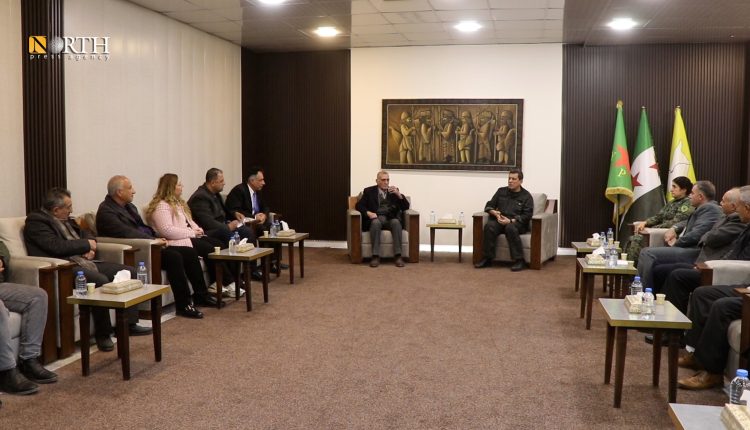SDF Commander Meets Activists and Lawyers to Discuss Syria’s Future and Kurdish Dialogue
By Kardo Roj
HASAKAH, Syria (North Press) – General Mazloum Abdi, commander of the Syrian Democratic Forces (SDF), held a high-level meeting with human rights lawyers, civil society activists, and independent figures to discuss Syria’s future, intra-Kurdish negotiations, and ongoing talks with Damascus. The meeting, which took place on Tuesday in Hasakah, brought together legal experts from Raqqa, Tabqa, and Qamishli, as well as representatives from the Independent Popular Initiative and local activist movements.
The discussions centered on the importance of a comprehensive national dialogue, with an emphasis on ensuring the readiness of northeast Syria’s diverse communities to engage with other Syrian factions. According to lawyer Mohammad Amin al-Nuaimi, the meeting reinforced the principles of international law, citing the UN Charter’s 2015 Security Council resolution, particularly Article 8, which acknowledges the legitimacy of self-defense and human rights protections in northeast Syria.
General Abdi provided an update on the latest political and military developments, particularly regarding the status of negotiations with the Syrian government. He emphasized that the coming phase would involve broader internal discussions within northeast Syria’s communities to clarify the region’s stance on talks with Damascus and ensure inclusive participation in shaping the area’s future.
One of the key topics discussed was the stalled negotiations between Kurdish political factions, particularly between the Kurdish National Unity Parties (PYNK) and the Kurdish National Council (ENKS). Activist and legal expert Agid Barfo noted that while progress had been made in bridging differences, external interference—particularly from Turkey—had hindered further agreements.
Abdi confirmed that there is ongoing communication with Damascus and hinted that new developments from these talks could emerge within the next two weeks. He also indicated that efforts were underway to facilitate a Kurdish National Conference, which would include a broader range of Kurdish political actors beyond the two main factions currently in talks.
According to Barfo, March 2025 will be a decisive month for both intra-Kurdish negotiations and broader discussions with Damascus. The outcomes of these talks could significantly shape the political future of northeast Syria and determine whether the region moves toward greater autonomy or a new framework within a restructured Syrian state.
As political dynamics shift and regional actors continue to exert influence, the next steps in dialogue—both Kurdish-Kurdish and Kurdish-Damascus—will be closely watched by stakeholders within Syria and beyond.

